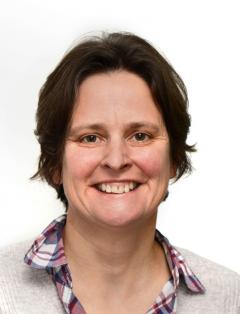Dr Fiona Houston on transmission of prion diseases
Prion diseases in animals and people, blood transfusions, commonalities with Alzheimer’s and Parkinson’s and her love for gardening.

Dr Fiona Houston is a Group Leader at The Roslin Institute, doing research on prion diseases – rare progressive neurodegenerative disorders that affect both humans and animals. In this interview, she tells Science Communication Intern Maggie Szymanska about her work.
Could you describe your work in a nutshell?
My current research focuses on prion research in animals. A well-known prion disease is BSE, or so-called mad cow disease. It has been shown that the human form of BSE (variant Creutzfeldt-Jakob disease – vCJD) can be transmitted through blood transfusions. A big focus of my work for over ten years has been using sheep as a model to study transmission of prion diseases by blood transfusion. We study this in sheep because they are of similar size to humans, allowing us to collect large volumes of blood and prepare it in the same way as is done with humans.
The focus now is to develop diagnostic tests for these diseases, as there currently isn’t a good blood-based test for these diseases in humans or animals. We are using the big bank of blood samples we have collected during the transfusion studies to find out which tests are best at detecting infected animals.
I am also currently interested in chronic wasting disease (CWD), a prion disease in deer, which has recently appeared in Norway. There is concern it might spread to the UK, and we are investigating how susceptible the UK deer population might be to this disease.
How did you become interested in this field of research?
I trained and worked as a vet, and I then did a PhD in immunology. When I finished my PhD, the first vCJD were being recognised in humans and that obviously caused a huge amount of public concern. There was an urgent need for research to understand the risks to animal and human health. I decided this was the route I wanted to take, and took up the opportunity to lead a new research group working on BSE and scrapie in sheep.
Where do you see the future of your research?
I think there are still a lot of unresolved issues within the prion disease field. Although BSE has been controlled and the number of cases of variant CJD has declined, there is always the potential of them coming back. For instance, the outbreak of CWD in Norway was completely unexpected and we still don’t have an explanation for why it occurred. So, it’s important to keep looking at these diseases and understand the factors involved in their emergence and persistence.
In terms of my own research, I think there are common features between these diseases and other neurodegenerative diseases such as Alzheimer’s and Parkinson’s disease. There is quite a lot of interest now in looking at large animal models for these diseases. As sheep live longer and have more complex brains than mice, they may be a better model to study diseases of aging. Some of the sheep in our projects are quite old, so we can look into MRI imaging and pathological changes in the brains of these sheep and compare them to elderly humans.
Do you have a favourite project from your time here?
I’ve been involved in a lot of studies but my favourite one was the blood transfusion work I mentioned earlier. The first experiment was started in 1998 and back then, nobody thought blood was infectious. I remember setting up the blood transfusion experiments at the time and thinking it would be a completely negative result. To everyone’s surprise, including our own, we showed for the first time that a sheep developed prion disease as a result of blood transfusion. At the time, nobody believed it, people thought that we had messed up the experiment or there was contamination.
Luckily, as time went on, more and more research confirmed our findings, and it changed the way people thought about the risks to humans. Making that link with human health was really eye opening.
What are the main challenges of your research?
When you do large scale scientific projects, the experiments may sound easy when you explain them, but actually doing them, organizing all the necessary aspects and ensuring it works is very challenging.
And finally, if you weren’t a scientist, what would you be?
I would like to be a farmer. I love animals, but I also love gardening, especially growing vegetables and learning new ways to cook with them. I often think that would be the route I’d go down if I wasn’t in science.
Related links
Comment on BSE case in Aberdeenshire


